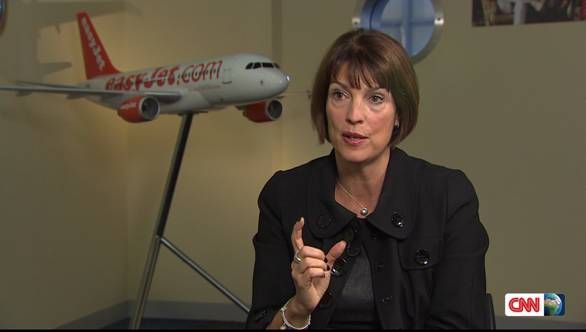CNN’S RICHARD QUEST INTERVIEWS EASYJET CEO CAROLYN MCCALL
Richard Quest speaks with Easyjet CEO Carolyn McCall. They talk about their changing strategy to appeal more to business travellers, how they can achieve this without sacrificing their low-cost model and the future of Easyjet post Stelios.

FULL TRANSCRIPT
RICHARD QUEST, CNN ANCHOR (voice over): EasyJet is Europe’s second largest carrier, with 20 operational bases across Europe. It now flies 50 million passengers each year. Under McCall the airline is shifting its strategy, aiming to appeal to business travellers, which is risky because of the potential increase in costs.
CAROLYN MCCALL, CEO, EASYJET: First bear in mind that one in five of our travellers are already travelling on business. So we already have between 18 and 20 percent of our current passengers who are travelling for business. So we have a very credible position. So people have found us. We have marketed anything to them. Secondly, what they said to us is, if you had a product that gave us more flexibility and you had a slightly better schedule to some of these primary airports, we would use you more. Or we would actually reconsider you for business travel.
So what we have done on that is we now have a flexible fair product, called FlexiFare, very original. And it gives you complete flexibility to change you flight within a window of a month.
QUEST (on camera): You see the thing about business travellers, you are right they are flying you anyway, but they are flying you because that is where you go. What you need to do, of course, is to get them to like flying you.
MCCALL: When business passengers try EasyJet, they rarely go back to the carrier they were using before. And the reason for that is, it is extremely good value. It is efficient and they really like the warm and friendly service. Our crew are fantastic. And that is a really (AUDIO GAP) for us.
QUEST: McCall is messianic about making sure she does nothing to destroy the low-cost model.
MCCALL: EasyJet can be Europe’s short-haul airline, and to do that what we have to do is absolutely be low-cost in our business, and operating model, because we can then do low fares for our passengers, so EasyJet lean is in everything we do. Lean thinking.
And secondly, that we can really drive our RPS, our revenue per seat; and the way we can drive our revenue per seat is by looking at the business passenger. So that is a very important part of the strategy.
I’m Carolyn. How are you doing?
UNIDENTIFIED FEMALE: I’m good. How are you?
MCCALL: I’m fine. Thank you. How is it going?
UNIDENTIFIED FEMALE: Not so bad.
MCCALL: You all right?
You get your people right. You get your customers right. Because actually, you know, we had lost sight—slightly—of the customer, the passenger in all of this. And we are very customer focused. And that doesn’t mean we add cost. We don’t layer in cost. It doesn’t take a lot to be helpful, friendly and to smile.
QUEST: You are bundling back in again, aren’t you?
MCCALL: No. No we’re not.
QUEST: Bags in the hold.
MCCALL: You don’t have to take a bag in the hold. We are not bundling you in any way.
QUEST: Your critics say you are moving away from the low-cost model.
MCCALL: We are really proud of having a low-cost operating model. And the reason we are really proud of it, is we can give low fares to our passengers.
QUEST: InEurope, do you see more consolidation coming along? And if so, are you going to be part of it?
MCCALL: We have a lot more to grow, organically, and we can do it stealthily. We are very cautious about the next two years. We have capped our fleet for the next two winters. We don’t believe the next two years inEurope, maybe longer, is going to be very pretty.
So to answer your question, when you think about the cost headwinds for this industry, you know the unprecedented high fuel for a very sustainable period of time, that is gong to cost us 220 million pounds, more year on year. Emissions (UNINTELLIGIBLE) schemes for the first time ever, that is going to cost us money. APD, who knows what this government is going to do on that. They should not be taxing passengers. But who knows? That doesn’t seem to be the trend.
So we have got some really severe headwinds. In addition to that we have a Eurozone in crisis. So I think consolidation is going to be inevitable in some way over the next three to five years. EasyJet’s entire strategy is based on organic growth, not on MNA.
QUEST: (voice over): Carolyn McCall has also had to deal with the majority shareholder Stelios, who has frequently questioned the board of directors’ competence and called for some directors to be fired.
MCCALL: We deal with all our shareholders and our entire approach is that we want a constructive dialogue. And that is exactly what we are doing with our largest shareholder. You know, he makes some very good points about growth and aboutEurope and about the Eurozone. You know, we listen.
QUEST (on camera): One year on, Carolyn McCall is as a seasoned chief exec is warming to her task of giving the airline direction, depth and gravitas. Some things, though, will never change. Like that color.
Have you learnt to love or hate the color orange, yet.
MCCALL: I’ve always loved it. I swear. I had an orange, very smart, jacket, before I joined EasyJet, which I have never worn since I’ve been here. But I love orange.
(LAUGHTER)
It’s a happy colour.
END
Rachael Booth De Perea Press CNN International Tel: +44 (0) 20 7693 0945 Mob: +44 (0) 7984 071574